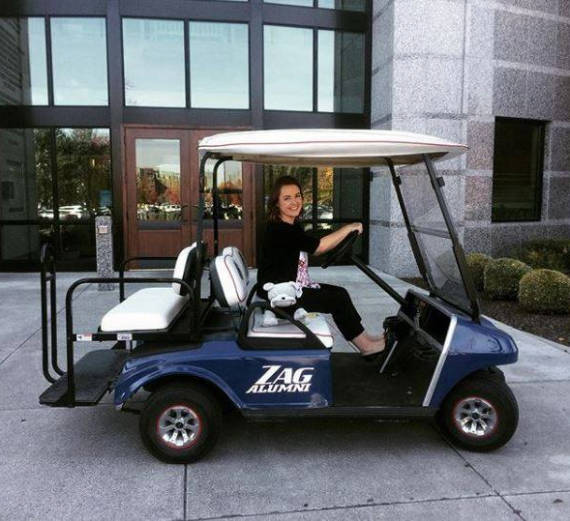InBalance Newsletter Q&A with Bryn Boorman

What is your position and department at Gonzaga?
I am a Program Coordinator at the Law School.
What does sustainability mean to you?
I think of sustainability as doing what I can when I can to leave the planet better than I found it.
How have you been involved in promoting sustainability on campus?
I’ve been fortunate to support several sustainability upgrades, including conducting the first waste audit anyone can remember at the Law School and using the findings to advocate for new waste sorting centers and better signage. After putting up a fight when I found out Keurig machines were replacing our traditional coffee pots, we compromised by joining the K-Cycle program. Our k-cups go to a special recycling center where the entire k-cup is turned into compost or recycled. But I think the most significant area I can effect change is events (because it’s my job!). I try to find new ways to make our events more sustainable, from using uncoated paper to ensuring everything on the buffet line (including plates and utensils) is compostable. But it’s always a balance. Sometimes the more sustainable solution causes accessibility issues for older or mobility impaired attendees (e.g., QR codes are not useful for elderly attendees and paper straws are not flexible for those with mobility issues). There’s never a perfect answer, so I fall back on the idea of doing what I can when I can. My newest challenge is taking on swag – how can we find cost-efficient swag items made in an ethical and sustainable process that won’t end up in a landfill?
What are some things you do in your personal life to live sustainably?
I’ve always tried to be conscious of my energy consumption. When I was little, my mom had to fire me from my job as the family “light monitor” because I would turn lights off that people were using. Can I put on a blanket and sweatshirt instead of turning up the heat? Can I air dry my clothes instead of using my dryer? In 2019, my challenge was to swap an item each month for a more sustainable item (swapping out disposable razors, cotton balls, toothpaste tubes, shampoo bottles, etc.). Refusing plastic was a tough swap, but I’m pretty accustomed now to the weird looks I get when I say, “No to-go box, please. I’ll just carry this food out in a napkin”. In 2020, my Amazon purchases went way down because I focused on buying local, even if it meant not getting the best price. For 2021, I’m focusing on buying locally raised meat (I’m still talking myself into eating less meat).
How could Gonzaga continue to improve its sustainability efforts?
Gonzaga has an excellent framework for sustainability. I recently joined the employee sustainability ambassador program and was surprised to hear about sustainability initiatives on campus that are entirely new to me. So we already have terrific initiatives and programs – we need to keep getting others involved so our impact gets bigger while our footprint gets smaller. With enough involvement, these “changes” will become “best practices,” and eventually, they will become the norm.
How will you continue to promote sustainability at Gonzaga?
I think spreading the word and educating each other will make a huge impact. There’s so much to learn, but I think we learn best by seeing the examples others set for us. Many of the practices I’ve implemented in my work are what I’ve seen from coworkers, other campus event planners, or Sodexo.
How do you see sustainability intersecting with social justice issues on an institutional, country, or global scale?
I was blessed to live in Haiti before the 2010 earthquake. At the time, I saw the issues of social injustice and how it led to non-sustainable infrastructure, but I wasn’t yet familiar with the term environmental justice. Since the earthquake, I’ve seen plenty of social justice failures – a cholera epidemic caused by unthoughtful waste disposal, aid projects slapped up that will eventually fall back down, roads laid down without thinking about how they affect the neighborhoods around them, aid groups that come to do work that Haitian workers could have done with the money reinvested in the local economy. But I also saw the good – an aid worker who really listened to a Haitian woman when she said, “I don’t need a bottle of water. I need a job.” Now that woman is a manager at a fair-trade company that makes beautiful sandals and jewelry out of discarded tires. So many fair-trade organizations have sprung up in Haiti in the last decade to empower Haitians, so they can have dignity and invest in their economies. In 2018, I spent a week in Haiti visiting different artisan groups who have trained up Haitians in fair-trade crafts and are making beautiful goods in a sustainable, ethical way. I went to a malnutrition clinic that focuses on a holistic approach to healthy children – not only getting the child to a healthy weight but teaching the parents how to grow gardens and manage finances. I hope to make a trip back this year with my nephew (who studied water science in college) to visit with farmers teaching sustainable farming methods and working with reforestation efforts. Without fail, everyone I meet who has made this type of difference in their community just set out to make a small difference in their neighborhood – to do what they could when they could – and their efforts are transforming the world around them. This is what is happening on one half of a small island – great things like these are happening everywhere. That’s a bandwagon I was excited to jump on!
